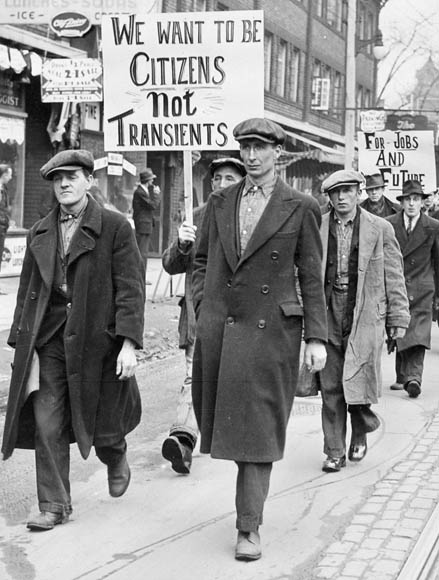The Cult of Subprime Central Bankers
 Dean Baker, of CEPR
Dean Baker, of CEPR
writng at Huffington Post, May 27, 2010
See article on original website
The world is suffering from the worst downturn since the Great Depression. The crisis has left tens of millions unemployed in the U.S., Europe, and elsewhere. The huge baby boomer generation in the United States, now on the edge of retirement, has seen much of its wealth destroyed with the collapse of the housing bubble.
It would be difficult to imagine a worse economic disaster. Prior periods of bad performance, like the inflation ridden seventies, look like mild flurries compared to the blizzard of bad economic news in which we are now enmeshed.
None of this is new. People don’t need economists to tell them that times are bad. However, what the public may not recognize is that the same people who caused this disaster are still calling the shots. Specifically, there has been little change in personnel and no acknowledgment of error at the central banks whose incompetence was responsible for the crisis.
Remarkably, this crew of incompetents is still claiming papal infallibility, warning governments and the general public that bad things will happen if they are subjected to more oversight. Instead, the central bankers and their accomplices at the IMF are dictating policies to democratically elected governments. Their agenda seems to be the same everywhere, cut back retirement benefits, reduce public support for health care, weaken unions and make ordinary workers take pay cuts.
Given how much they have messed up, it is amazing that these central bankers have the gall to even show their face in public. They are lucky that they still have jobs — and very good paying ones at that. (Many of the boys and girls at the IMF can retire with six figure pensions at the age of 50.) Ordinary workers, like teachers, autoworkers, or custodians, would be fired in a second if they performed as badly as the world’s central bankers.
 What was going through their heads when they saw house prices in the United States, the UK, Spain and elsewhere spiral upward with no basis in any of the fundamentals of the housing market? How did they think this bubble would end; did they think that trillions of dollars of housing bubble wealth could just disappear without any impact on the economy. Or, did they think the bubble would never end and that house prices would just continue to go skyward forever?
What was going through their heads when they saw house prices in the United States, the UK, Spain and elsewhere spiral upward with no basis in any of the fundamentals of the housing market? How did they think this bubble would end; did they think that trillions of dollars of housing bubble wealth could just disappear without any impact on the economy. Or, did they think the bubble would never end and that house prices would just continue to go skyward forever?
How about the central bankers who allowed the euro to be imposed on a mix of economies with very little in common and no controlling governmental organization? Did they think that wages and prices would follow the same pattern in Greece and Germany? If not, what adjustment mechanism did they envision once these widely different economies were tied to together in a single currency?
Yes, many of the central bankers are now saying that they knew the euro was a bad idea back when it was established. Some of them even muttered quietly to this effect. But the central bankers and the IMF in 1998 were not making the same bold pronouncements and issuing the same directives to elected governments about structuring the euro zone that they are now doing in telling them to dismantle their welfare states. In other words, these central bankers failed disastrously — why do they still have jobs and why on earth is anyone listening to them?
At the top of the list of villains in this story is the IMF. Its ineptitude managed to reverse the fundamental flows of capital in the world economy. In normal times capital is supposed to flow from wealthy countries with large amounts of capital, like the United States and the European countries, to the developing countries who need capital to fuel their development. Due to the failure of the IMF to establish a workable system of international finance, the flows went in the opposite direction in a huge way. The world’s poor were sending their capital to the United States because the IMF gave them little choice.
It is important to be clear about the responsibility of the central bankers and the IMF for this totally preventable disaster. The first reason is accountability, something that is very important to economists who believe in economics. Economic theory teaches us that if workers are not held accountable for poor work, then they have no incentive to do their jobs well. If the central banker and IMF crew can mess up disastrously and continue to draw their paychecks as though everything is fine, what is their incentive to do better next time?
The other reason why it is important to recognize the responsibility of the central bankers and the IMF for this disaster is so that we don’t continue to take advice from people who apparently don’t have a clue. Before anyone listens to Ben Bernanke, European Central Bank President Jean-Claude Trichet, or IMF Managing Director Dominique Strauss-Kahn, they should first be forced to tell us when they stopped being wrong about the economy. We cannot afford to let these subprime central bankers control economic policy any longer.
Dean Baker is the co-director of the Center for Economic and Policy Research (CEPR). He is the author of False Profits: Recovering from the Bubble Economy. He also has a blog, "Beat the Press," where he discusses the media’s coverage of economic issues.
Second photo: thanks to Jr. Deputy Accountant


